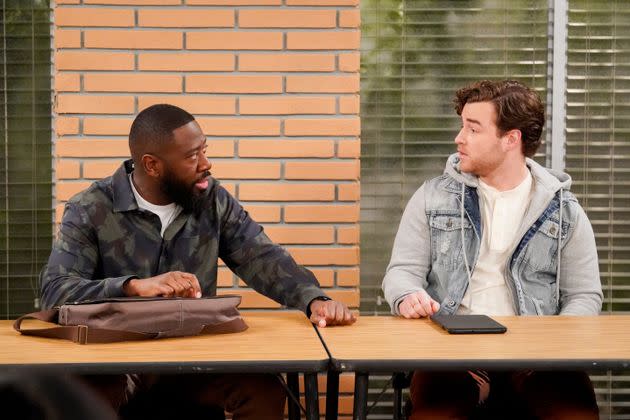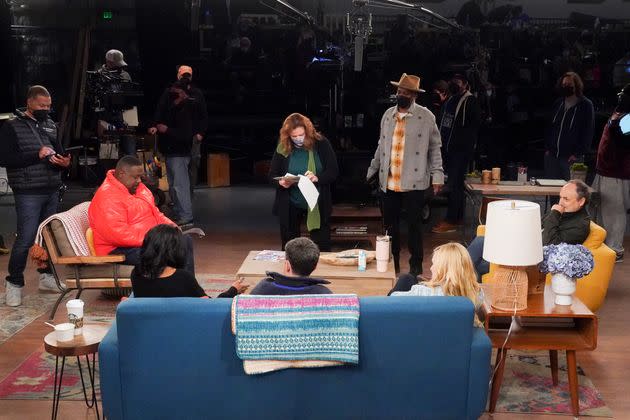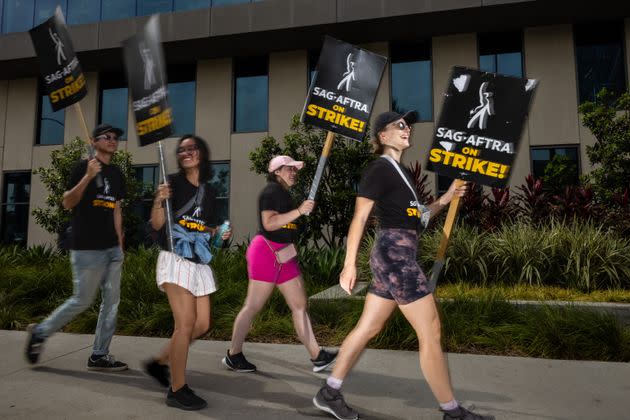I Made My TV Debut The Same Day The Hollywood Strike Began
- Oops!Something went wrong.Please try again later.
I Made My TV Debut The Same Day
The Hollywood Strike Began

Matthew Keith
Matthew Keith is a 24-year-old comedy writer and actor in Los Angeles. Raised in Franklin, Tennessee, Keith is an alumnus of the University of North Carolina at Chapel Hill and has been drawn to the stage since adolescence. After two years of working professionally, he served as a writers’ production assistant on CBS’s “The Neighborhood,” and played Stew in Season 5 of the series. With those positions, he is SAG-eligible and is working toward his chance to join WGA. Until Hollywood execs agree to a fair deal, he is working as a barista to stay afloat.
What has your career trajectory been like so far, and when did you land your first professional gig in entertainment?
The pandemic absolutely played a part at the start of my career. I graduated in 2021 and moved to LA right as things were reopening. But it was still slow to start. I was really lucky that I had a school program that was facilitating some internships, then also connecting me to alumni in the industry. So, I was connected to people that I could talk to and that could help me. I worked two unpaid internships for a summer, then wasn’t able to find work after that. I had to just take a job in a music festival company for nine months just to have one. Then, it got to the point where I still wasn’t able to find a job in the TV/film space for a good while.
So I literally left that job with no other job yet. I had to reassess and get back to my initial intention, but still without any prospects necessarily. Then I worked as a temp for about a month at NBC Universal. A friend set me up with a job there, then I got a call for a writer’s production assistant position at “The Neighborhood” on CBS. It was almost a year in LA when I finally got that TV gig. I got a luckier break than a lot of friends.
Had you always planned to pursue a career in entertainment? What was the conversation like with your loved ones regarding professional stability?
I was an actor first and then got into writing in college and was like, “Oh shit, this is fun!” I knew it would be incredible having a little control over the art form that I really enjoy and it just makes me feel safe at home. I had always had an interest in it and a lot of that comes from my older sister, Abby, who wrote before me and was super into film and TV. I luckily come from a family that’s very supportive of all of this. Obviously, I would love to have security. I would love to have a steady and growing income. If there was anything else I wanted to do, I sure as hell would be doing it, especially right now.
I’ve been back in Chapel Hill, visiting with less than $5 in my bank account. There have been situations between jobs where it’s been very much, “Oh my god, I need to get something now.” When the writers strike started, I had some money built up from my previous job where I was like, “OK, I’m doing alright.” It just kind of dwindled faster than I thought to the point where I was like, “Oh, I need to get a job now.”

Series regular Sheaun McKinney (left) stars as Malcolm alongside Matthew Keith (left), who played Stew, in Season 5, Episode 19 of CBS's "The Neighborhood."
Were there any conversations in your orbit regarding a forthcoming strike? Did you have money saved up? On the note of money, have you been able to join SAG and WGA?
Luckily, my staff on the show I was working on before the strike got to finish everything on schedule. But the staff was very helpful and also very aware of the possibility of the strike coming forward. Some staff members would talk to me at lunch and be like, “Hey, this is happening. Maybe do X, Y and Z. Maybe save a little money here and there. We never know how this is gonna go. We also know from the past that if it does become a strike, it could be long.” So had I not had them, I might not have even had what I had that first month to get me by. I’m not in the WGA yet. I don’t believe I qualify, but I’m working toward getting the chance to be in the WGA. The strike feels like it’s the strike for my future.
I’m SAG-eligible now, which is nice, just given that “Neighborhood” role that I had. But I did not join because the dues are very high, and I’m not in a position to be offered SAG roles consistently.
Tell me a little bit about what this strike means for you.
For the WGA strike at least, I had actually saved up money and gone on my first big adult vacation for myself the week before. The whole vacation I had in the back of my mind, “Don’t spend too much money.” I knew it was pretty likely that the moment I got back, I was not gonna have a job during the strike. That next day after I returned to LA was the last day for negotiations. May 1 was also the day that my episode of “The Neighborhood” that I appeared on aired.

"That just doesn’t really happen as often anymore, given the streaming model," said Keith, regarding the traditional 22-episode season format. "It’s insane that I’m in the middle of one of the older dying arts of TV comedy."
Of course, the dumbest luck in the world: The day that I made my TV debut, one of the most consequential strikes, hopefully, of my life, began.
Are there specific proposals that the AMPTP has ignored that are particularly concerning to you?
Being taught what a mini room was during this writers’ production assistant gig made me very afraid of that as a reality, especially talking to staff writers who’ve worked years to get to that staff writer position. That was an initial scare for me as someone who finally got that big break of a title that has “writer” somewhere in it.
The biggest hurdle might be just becoming that writer at all, because no studio, show or system is allowing that to happen. Then, honestly, AI has put a dreadful feeling in my stomach. I didn’t even think it was a huge deal when all of this was starting. I heard it was being talked about and I was like, “Oh, that’s funny. That’s sci-fi.” And then suddenly, the studio’s response is “Let’s table this conversation and come back to it at the next negotiations.” And I’m like, “Whoa.”
“I just want it to be a system where people are rewarded for their work, can make a living and don’t have to worry that someone is stealing from them day in and day out.”
We all know it advances and is exponential in growth. So what it could be next month is not what it is today. “Let’s table this till next discussion” was the studio’s answer about streamers, I believe, in the last strike is what I’ve been told. So we saw how the Wild West of streaming has made its own rules: cutting down residuals, cutting out writers from getting paid in a lot of different ways. If you have all of those years of this brand new platform being developed without an agreed-upon set of rules from all sides, of course, the people doing this for money are gonna fuck you over.
What does this strike say about the state of capitalism?
Ooh, big question. So now, I am working as a barista. I’m pretty much just trying to make rent and stay out here for the duration of the strike, so that when it ends I can crack back into the industry however possible. I’m taking time to keep writing my samples so that, when it all comes back, I can have stuff to give to writers, agents or managers. I’m doing as much work as I can without crossing picket lines: making sketches, short films, then hoping that it ends soon so that I can get back to working where I want to be.
In terms of capitalism, it was already a disheartening industry to enter as a creative and, like I said at the top, if there was anything else I wanted to do as much, if not more, you know I would be doing it. Because livelihood, stability, none of that is guaranteed and none of that is even on the table, sometimes, for years, starting out in Hollywood. Going back to the conversation about shows ending prematurely and not being given a chance to raise their ratings even if they’re really good: If you are a creative executive and you choose to kill some of the best content being produced because of initial ratings, the money behind it, or heaven forbid, it’s a diverse voice and that just makes you uncomfortable or you don’t see it taking off because you don’t think that’s possible, take the creative out of your title. You’re not doing the creative work. You’re getting the money for the creative work, and you are a filter. You’re not even the one doing the things. You are the filter through which creative work is passing, and your job is to say yes or no, not to create a world to replicate human emotions and the experience. You should not be the one profiting off of what the real work is and who is doing the real work.

Members of WGA and members of SAG-AFTRA picket in front of Netflix headquarters in Hollywood on July 31.
And you’re talking directly about executives and chief creative officers when you reference those people that are actually not the creatives.
Studio executives, heads of networks, heads of streamers. It’s so disheartening that the system is rigged so that money can be made by those who are not doing the creating. That’s been the trouble with Hollywood since its beginning: The writers have always struggled for credit, for money. They can put in their product, they can hand you a script and their work is done. But you’ve got nothing to film if you’ve got nothing on a script.
Ultimately, what would you like the outcome of this strike to be?
I would like for writing, for acting, for all of these creative pursuits to be livable-wage jobs with fair conditions. Storytelling is something that people have always had, and I think storytelling makes us better people and stronger people by sharing those stories.
What would you like people to understand about the next generation of entertainment workers?
I think we’re lucky enough that we are given the information and seek it out to see that there’s injustice in the system right now. We see that the way the system is set up is not right. It is rigged toward a select few who do some of the least amount of work and profit off the creative labor of very talented, very inspired people. I just want it to be a system where people are rewarded for their work, can make a living and don’t have to worry that someone is stealing from them day in and day out.
I am very lucky in every aspect of my career thus far. Even the struggles of it all.
Read how other Gen Z entertainment workers are navigating the Hollywood strike here.
